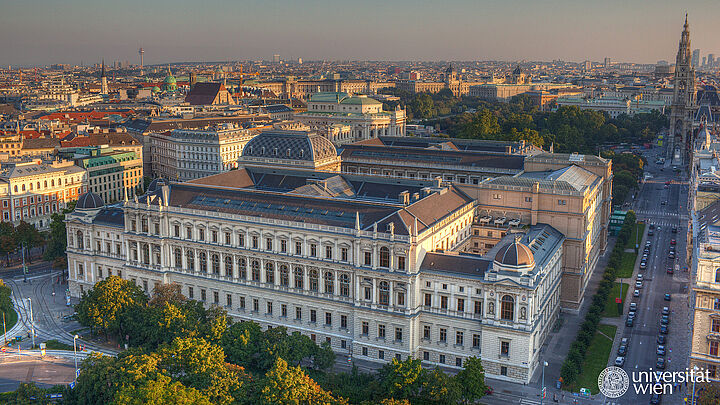Freitag, 04. April 2014, 09:30 - 20:30 iCal
Cities as Cultural Spaces.
Ukraine: History, Legacy, Literature.
Universität Wien, Institut für Osteuropäische Geschichte
Spitalgasse 2, Hof 3, (Hörsaal) , 1090 Wien
Tagung, Konferenz, Kongress, Symposium
Weitere Termine
Donnerstag, 03. April 2014, 18:00 - 20:30
Samstag, 05. April 2014, 10:00 - 12:30
In the course of the last two decades following the spatial turn in the humanities and social sciences, interest has grown in concepts of space that challenge the ideas of national cultures and historiographies that continue to dominate regions such as East Central Europe to this day. Within this recent tradition, space and culture are no longer understood as fixed entities, but as fluid, hybrid and process-like phenomena. In this context, the idea of a three-dimensional and territorial concept of space imagined as a container for a specific national culture have become fundamentally eroded.
Ukraine has been present on the political map of Eastern Europe for about as long as the spatial turn itself. The oft-mentioned notion of a “divided Ukraine” split between East and West demonstrates the problems caused by simplifying views of monolithic national cultures located on a physical territory. How does recent research in the humanities in the spirit of the spatial turn affect research on “Ukraine” – be it conceived as a territory, a region, a nation or the recent state? By focusing on urban, rather than national, cultural spaces, this conference will explore the question of how critical concepts of space and culture can further enrich historical and cultural research on Ukraine.
We conceive urban cultural spaces as spaces where cultural structures and institutions are shaped, where opinions are negotiated and where cultural practices take place. The city, as a place made and imagined by humans generates manifold private and public spaces which are charged with meaning, both utopian as spots of modernity and progress as well as dystopian, connected with decay, anonymity and violence. Moreover, cities with their multiple memory spaces provide the frame for the practices and policies of dealing with an often contested past. Rather than using once more the term and paradigm of collective remembrance, which has mostly focused on traumatic experiences such as the Shoah, the conference will focus on the manifold and selective (re)appropriations of imperial legacies which can be observed in contemporary Ukraine. Therefore, in dealing with cities that are located on the territory of today’s Ukraine, we intend to open the floor for several fields of discussion by three specific panels.
Panel 1 focuses on urban history. Since historiography dealing with things Ukrainian is still marginally concerned with urban development or the history of Ukrainian cities, and has previously tended to conceive them as stages for national movements, we would like to fill this gap by discussing cultural practices that are generating urban cultural spaces, such as the institutionalization processes of opera and theater, their role in the formation of public space and the impact of cultural transfers from abroad.
Panel 2, Representing imperial legacies, will debate memory practices in Ukrainian cities related to the imperial past and the transnational entanglements of the time. How are the imperial legacies dealt with today? How do city spaces, museums and other cultural institutions or the (re)construction of buildings represent the past and what does such an “editing” of cityscapes tell us about the present? How present or absent is the Soviet past in such narratives of the city as a story – and what do these narratives look like in Kyiv, Lviv, Odessa and Kharkiv?
Related to these two first panels, Panel 3, Literary urban landscapes, invites studies of literature which deal with the literary representation and imaginary construction of urban space. To what extent can the metaphor of “the city as text” be applied while analyzing the text production about / of urban spaces, and what do these written cityscapes look like in writing in different languages, e.g. Polish, Ukrainian, Russian, German or Yiddish?
Taking into account the recent political developments in Ukraine, we will also provide the opportunity to discuss them in a roundtable dedicated to Urban Spaces and the political ideas of Euromaidan.
The conference is organized within in the framework of the international research project “Region, Nation and Beyond. An Interdisciplinary and Transcultural Reconceptualization of Ukraine” which is jointly financed by cooperation between the state-sponsored German, Swiss and Austrian research Funds (DFG, Nationalfonds, FWF).
Zur Webseite der Veranstaltung
Veranstalter
Kontakt
Birgit Kuch
Institut für osteuropäische Geschichte / Institut für Slawistik
+43-1-427741121
birgit.kuch@univie.ac.at
Erstellt am Mittwoch, 19. M�rz 2014, 15:37
Letzte Änderung am Donnerstag, 03. April 2014, 09:10

